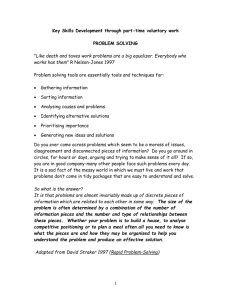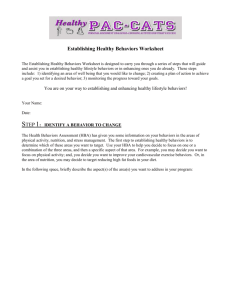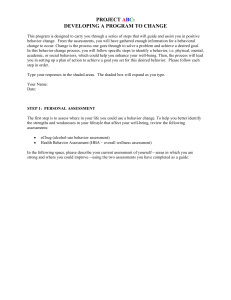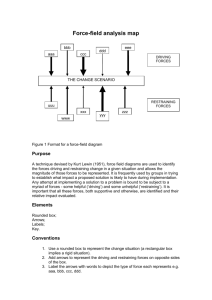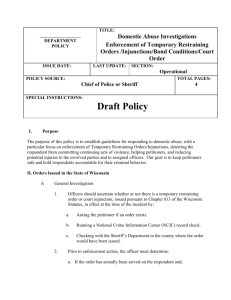Force Field Analysis
advertisement
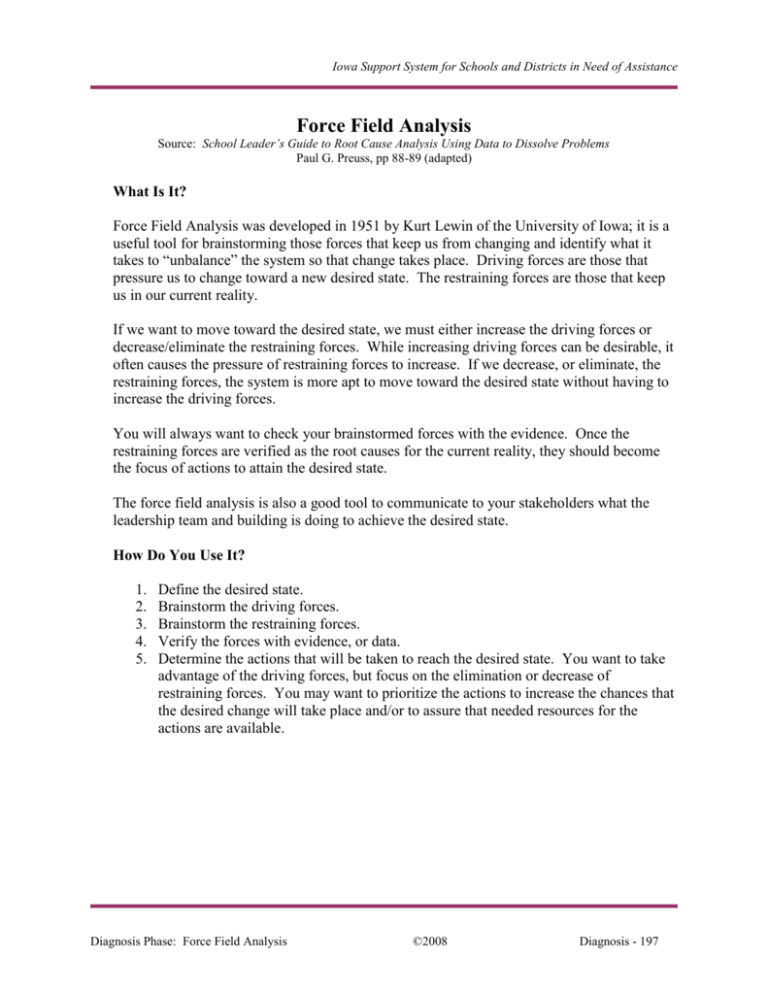
Iowa Support System for Schools and Districts in Need of Assistance Force Field Analysis Source: School Leader’s Guide to Root Cause Analysis Using Data to Dissolve Problems Paul G. Preuss, pp 88-89 (adapted) What Is It? Force Field Analysis was developed in 1951 by Kurt Lewin of the University of Iowa; it is a useful tool for brainstorming those forces that keep us from changing and identify what it takes to “unbalance” the system so that change takes place. Driving forces are those that pressure us to change toward a new desired state. The restraining forces are those that keep us in our current reality. If we want to move toward the desired state, we must either increase the driving forces or decrease/eliminate the restraining forces. While increasing driving forces can be desirable, it often causes the pressure of restraining forces to increase. If we decrease, or eliminate, the restraining forces, the system is more apt to move toward the desired state without having to increase the driving forces. You will always want to check your brainstormed forces with the evidence. Once the restraining forces are verified as the root causes for the current reality, they should become the focus of actions to attain the desired state. The force field analysis is also a good tool to communicate to your stakeholders what the leadership team and building is doing to achieve the desired state. How Do You Use It? 1. 2. 3. 4. 5. Define the desired state. Brainstorm the driving forces. Brainstorm the restraining forces. Verify the forces with evidence, or data. Determine the actions that will be taken to reach the desired state. You want to take advantage of the driving forces, but focus on the elimination or decrease of restraining forces. You may want to prioritize the actions to increase the chances that the desired change will take place and/or to assure that needed resources for the actions are available. Diagnosis Phase: Force Field Analysis ©2008 Diagnosis - 197 Iowa Support System for Schools and Districts in Need of Assistance Force Field Analysis Source: School Leader’s Guide to Root Cause Analysis Using Data to Dissolve Problems, Paul G. Preuss, pp 88-89 (adapted) Driving Forces Restraining Forces Desired State Direction of Desired Movement Diagnosis Phase: Force Field Analysis ©2008 Diagnosis - 198 Iowa Support System for Schools and Districts in Need of Assistance Force Field Analysis Source: School Leader’s Guide to Root Cause Analysis Using Data to Dissolve Problems, Paul G. Preuss, pp 88-89 (adapted) State expectation – 100% by 2013-14 Curriculum not aligned with standards Community/Parents expect kids to go on to college Teachers see no sense of urgency Sanctions from state if not successful Instructional activities do not match tests Driving Forces Restraining Forces Desired State Middle-Level Learners Proficient in Math We want to do what’s best for our kids. We lack effective instructional strategies. We have new materials, based on research. Professional development is missing. Number of minutes in math is 30 minutes Direction of Desired Movement Diagnosis Phase: Force Field Analysis ©2008 Diagnosis - 199


